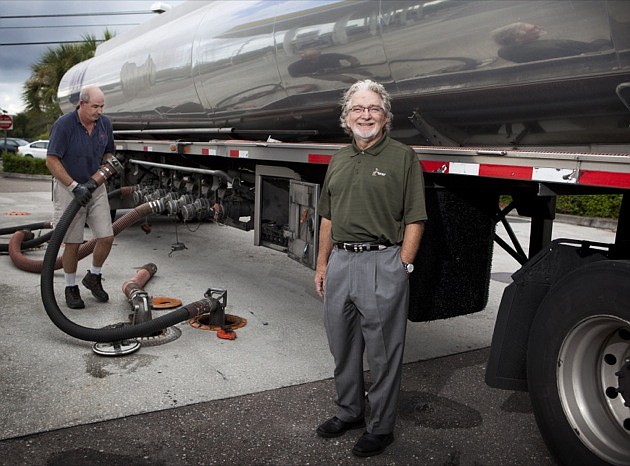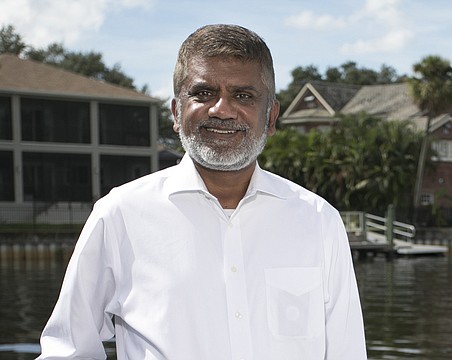Rally Stores Inc. President Bruce Mitchell likes what he's seeing with Gov. Rick Scott's regulatory reform efforts. That's because one rule change could save his company and its 14 gasoline station convenience stores half a million dollars a year, he estimates.
That's the bottom-line benefit for Clearwater-based Rally Stores if the state repeals a redundant Department of Environmental Protection rule as proposed. And with 7,000 gasoline stations statewide, that adds up to a total savings of $210 million to $280 million at $30,000 to $40,000 per station by Mitchell's count.
The rule required annual leak testing of gasoline tanker trucks in addition to federal inspection, and would have also required the replacement of gas dispensers. It's one of about 1,500 state rules slated for repeal out of more than 11,000 being examined.
Mitchell says the gasoline vapor control rule is an unnecessary layer of government interference. “Presently, each time a tank truck connects to the loading rack it is monitored for leaks, and if a leak is found the loading system will shutdown, so this is redundant to have an annual test,” he says in an email.
Mitchell, who is also chairman of the Florida Petroleum Marketers and Convenience Store Association, says doing away with the law will help the industry save time and money. Besides eliminating the redundant state inspection, the repeal removes the requirement for gas stations to replace gas dispensers at the pump with vapor recovery systems. Mitchell says tanker trucks already recover vapors when they load fuel into underground tanks, and new technology in vehicles does it as well.
The regulation is one of 438 that Department of Environmental Protection staff has identified for repeal, and it has pegged another 284 for revision out of the 1,800 rules it has total. Of the Department of Business and Professional Regulation's 1,633 rules, it has targeted 167 for repeal and 214 to be revised.
The one thing the soon-to-be ex-regs have in common is they drive up the cost of doing business in Florida, something Gov. Rick Scott seeks to change as part of his plan to produce 700,000 jobs in seven years. “All these things cost money,” says Scott. “It gets passed on to the consumer.”
Scott had barely taken his oath Jan. 4 when he signed Executive Order 11-01 to establish the Office of Fiscal Accountability and Reform (OFARR). That order, later challenged, also suspended all new rulemaking by agencies reporting to the governor, and required OFARR to review and approve all proposed agency rules before going into effect. On Aug. 16, the Florida Supreme Court ruled that only the Legislature may delegate rulemaking authority to agencies, and thus the governor cannot suspend agency rulemaking.
Since the order was issued, 20 state agencies have proposed at least 1,454 rules to be repealed and another 1,220 to be revised. Those rules will queue up for agency hearings during the next six months.
One rule change proposed by the Department of Business and Professional Regulation aims to help pari-mutuels, such as horse and dog tracks. It would eliminate a $15,000 fee for background investigations that with new technology can be done at little to no cost, according to Beth Frady, an agency spokeswoman.
A junkyards rule administered by The Florida Department of Transportation gets trashed, too. It only applied to junkyards along the interstate, but there are no such junkyards, according to Dick Kane, FDOT's communications director.
“I've dealt with it my whole business career,” Scott says of the business costs of overregulation. “If it wasn't for regulations, I could hire more people.”
Asked what set of rules he believes are most unnecessary and hurt businesses, Scott responds: “I think you have to look at every industry. I think every industry has rules that probably don't make any sense.”
The rules are being broken up into stages so as not to overburden the agencies all at once, says Scott's spokesman, Lane Wright. The 167 rules of the Department of Business and Professional Regulation are set to begin the agency review process.
In October, 311 rules, mostly from the Department of Environmental Protection, get their turn. That group will be followed by rules of the Department of Health and the Agency for Health Care Administration. Starting in February, water management district rules wrap up the process.
That may not be soon enough for Scott, who's anxious to see the state's job rolls swell. But he also sees the bright side. “The positive of all this is the 85,500 jobs this year. We're doing really well,” he notes pointing to the state lowering its 12% unemployment rate to 10.6%.
Still, he notes: “There are still 900,000 out of work. We need to do this every day.”
Examples of state rule changes:
Pari-mutuel wagering:
Rule 61D-4.001 — would eliminate the $15,000 a permit-holder applicant must pay for a background investigation. With new technologies, there is little to no cost.
Electrical contractors:
Rule 61G6-5.004(1) repeal — Applicants would no longer have to submit a statement of bondability or irrevocable letter of credit on the business for which they are applying to qualify. This saves the applicant the cost of the statement of bondability (about $100) or cost of irrevocable letter of credit, which requires $10,000 or $25,000 bank deposit for the term of the letter. It speeds up processing of the application and saves applicants from having to go to a bank or bonding company to obtain the document.
Hotels and restaurants:
Rule 61C-5.0085 amendment — Would allow workers to take continuing education courses online, which would save time and travel expenses.
Source: Florida Department of Business and Professional Regulation






